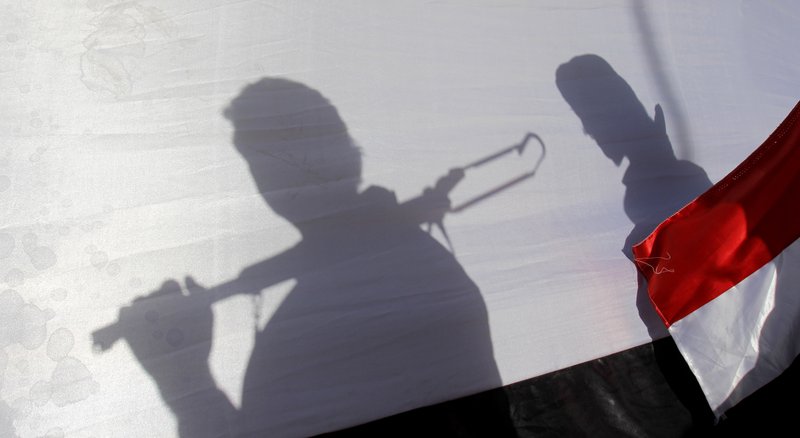SANAA, Yemen -- Al-Qaida's Yemen branch routed government forces from a large weapons depot in the country's east Friday, seizing dozens of tanks, Katyusha rocket launchers and small arms, security officials said, as airstrikes by a Saudi-led coalition intensified in the capital, Sanaa, and in Yemen's second-largest city.
The seized depot is located in Mukalla, the capital of Hadramawt, Yemen's largest province, where al-Qaida has been consolidating its control. Only the day before, the militants captured a major airport, an oil terminal and the area's main military base.
The gains highlight how al-Qaida has exploited the chaos in Yemen, where Shiite rebels are battling forces loyal to exiled President Abed Rabbo Mansour Hadi. The Saudi-led air campaign in support of Hadi, now in its fourth week, has so far failed to halt the rebels' advance.
Al-Qaida in the Arabian Peninsula, as the Yemeni affiliate is known, is widely seen as the global network's most dangerous franchise and has been linked to several failed attacks on the United States. The group claimed responsibility for the attack on a French satirical magazine in Paris earlier this year.
However, the Saudi-led air campaign has not targeted areas with an al-Qaida presence, including Hadramawt, where the militant group has long been implanted despite U.S. drone strikes and Yemeni counterterrorism operations. The coalition said the airstrikes are aimed at the rebels, known as Houthis, not al-Qaida.
On Friday evening, hundreds of al-Qaida supporters and fighters gathered at a theater in Mukalla to celebrate their victories in the Hadramawt region, singing war songs and chanting slogans.
Pro-Hadi forces gained some ground elsewhere in Hadramawt on Friday, with fighters capturing the province's Masila oil field, the country's largest, commander Ahmed Bammas said over the telephone.
On the other side of the country, Saudi-led coalition airstrikes targeting the rebels intensified, with bombings in Sanaa and also Taiz, the country's second-largest city. The level of bombings was the most intense since the campaign started March 26, the security officials said.
Thick plumes of smoke rose high above Sanaa as weapons stores in mountains overlooking the city exploded and burned, and local residents continued to flee the violence, said the officials.
In Taiz, the rebels clashed with army units loyal to Hadi, with tanks and heavy machine guns firing throughout the day and airstrikes hitting a military base of the Houthi-allied Republican Guard, the officials said.
Airstrikes also continued in Saada, the Houthis' northern stronghold, and Aden, the southern port city that the rebels have been trying to take for weeks, in cooperation with forces loyal to former President Ali Abdullah Saleh, they added, speaking on condition of anonymity because they were not authorized to talk to reporters.
Elsewhere on Friday, the leader of Lebanon's militant Hezbollah group strongly criticized Saudi Arabia, blaming the kingdom for the spread of extremist ideology in the Muslim world and the killing of civilians in Yemen.
Sheikh Hassan Nasrallah told hundreds of supporters at a rally in southern Beirut organized in support of the Houthis that Saudi-led airstrikes targeting them have not led to victory.
Nasrallah said the kingdom will soon realize that "the only choice left" is a ground operation in Yemen, and that a "ground invasion will be costly and will end with a defeat."
Nasrallah called on the Muslim world to pressure the Saudis to end the airstrikes and work for a political solution in Yemen.
However, he said no solution will restore Hadi to office. Saudi officials and the international community say Hadi is the legitimate president of Yemen.
Meanwhile, the United Nations urged the international community to provide $274 million in aid to help save lives and protect some 7.5 million people affected by Yemen's conflict.
In a statement, the U.N. said it needed the funds to purchase medical supplies, safe drinking water, food and emergency shelter and to provide logistical support for humanitarian missions.
Fighting between the rebels and forces loyal to Hadi intensified in March, with the Saudi-led coalition of major Sunni countries in the region launching the airstrikes March 26.
The U.N. Office for the Coordination of Humanitarian Affairs said the turmoil has killed hundreds of people and displaced at least 150,000. The U.N. said shelter is emerging as a pressing humanitarian need in the country.
Information for this article was contributed by Bassem Mroue of The Associated Press.
A Section on 04/18/2015

